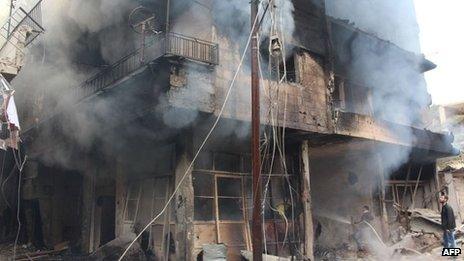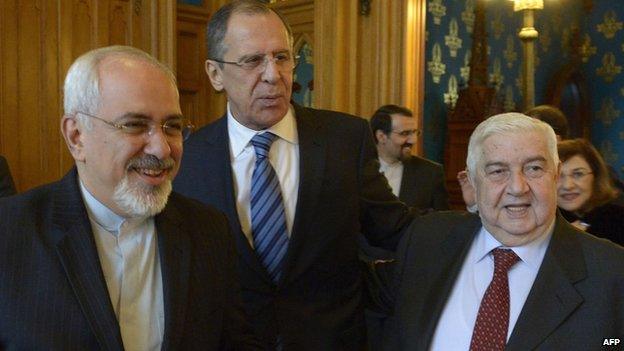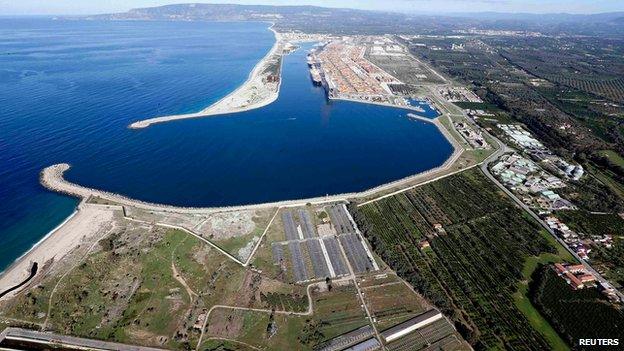John Kerry urges Syria opposition to attend talks
- Published

Syria has been devastated by the long-running conflict
US Secretary of State John Kerry has urged Syria's opposition to join next week's peace talks.
The divided main political opposition group, the Syrian National Coalition, is due to meet in Istanbul to vote on whether to go to the talks.
Mr Kerry stressed the aim of the so-called Geneva II talks was to begin the process of setting up a transitional government to end the war in Syria.
The three-year conflict has claimed the lives of more than 100,000 people.
An estimated two million people have fled the country and some 6.5 million have been internally displaced.
A number of Syrian opposition leaders are reluctant to go to Switzerland unless Syrian President Bashar al-Assad is excluded from any future transitional government.
Damascus says there should be no pre-conditions for the talks.
'Mutual consent'
"The United States urges a positive vote," Mr Kerry said ahead of the coalition's meeting later on Friday.
He described the 21 January Swiss peace conference as the beginning of a process "that is the best opportunity for the opposition to achieve the goals of the Syrian people and the revolution".
"It is about establishing a process essential to the formation of a transitional governing body with full executive powers, established by mutual consent," Mr Kerry also said.
"It is the only way to bring about an end to the civil war that has triggered one of the planet's most severe humanitarian disasters, and which has created the seeding grounds for extremism."
Mr Kerry stressed that only people "agreed by both the opposition and the regime" would be considered for a role in any future transitional government.
An official from the coalition told reporters earlier this week that they had been warned privately that Britain and the US would rethink their support if it did not attend the peace talks.
Syria's opposition is deeply divided.
The coalition's key bloc - the Syrian National Council - has threatened to boycott the talks.
Of the 120 members of the coalition, 44 have already pulled out of the meeting in Switzerland.
But all of them - and their regional backers such as Qatar and Saudi Arabia - are under huge pressure from the Americans and others to take up the opportunity to achieve the goals of the Syrian revolution, the BBC's Jim Muir in Lebanon reports.
However, our correspondent says that the coalition - if it goes - will be really weak, with huge doubts about how representative it is, as virtually none of the major fighting forces on the ground favour talking to the government.
Although the coalition is widely regarded abroad as the legitimate representative of the Syrian people, several other opposition alliances and powerful Islamist rebel groups refuse to recognise its authority.
In the past fortnight alone, more than 1,000 people have been killed in battles between rebel forces and jihadist fighters, an activist group reports.
Hopes downplayed
Our correspondent says that the appeal of the peace talks has been made less attractive by the leaking of the Syrian government's response to the invitation to attend the talks, which makes it clear the regime intends to focus on terrorism and has no intention of negotiating a transition of power.
Meanwhile, Syria's foreign minister, Walid Muallem, has been holding talks with his counterparts from Russia and Iran - who remain allies of Damascus - in Moscow.

Russia's Foreign Minister Sergei Lavrov (centre) insisted there was no "hidden agenda" regarding his meeting with his Iranian and Syrian counterparts.

Italian port Gioia Tauro was announced as the destination for ships transferring Syria's chemical weapons stockpile - something the mayor says he was not consulted about.
Russian Foreign Minister Sergei Lavrov said there was "no hidden agenda" to their meeting. "This does not mean that we have some tri-party (peace) draft," he told reporters.
Mr Lavrov is keen for Iran to be part of the peace talks, but Mr Kerry has said that Tehran must first agree to the Geneva I communique, external which calls for a political transition in Syria.
In Damascus, Syria's National Reconciliation Minister Ali Haidar dampened hopes of a breakthrough next week.
"Don't expect anything from Geneva II. Neither Geneva II, not Geneva III nor Geneva X will solve the Syrian crisis," he said.
"The solution has begun and will continue through the military triumph of the state."
Earlier on Thursday, the head of the UN body given the job of removing and destroying Syria's chemical weapons said the process had been slowed down by security concerns.
Ahmet Uzumcu, of the Organisation for the Prohibition of Chemical Weapons (OPCW), said additional measures had been put in place and they still hoped to have destroyed the stockpile by end of June as planned.
The decision to destroy Syria's chemical weapons stockpile arose from confirmation of a sarin gas attack in Damascus on 21 August, which killed hundreds of people and prompted international outrage.